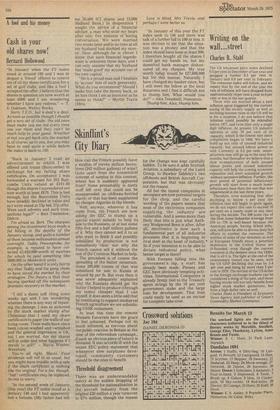Skinflint's City Diary
How can the French possibly have a surplus of eleven million hectolitres (242 million gallons) of wine? Quite apart from the nonsensical concept of surplus in this context, where has it suddenly appeared from? Some presumably is nasty stuff left over that could not be masqueraded as chateau-bottled claret; or that has been supplanted by cheaper Algerian in the blends.
Well, anyway, wherever it has come from, the French are now asking the EEC to stump up a special export subsidy to help its sale to the Russians, or at last some fifty-five and a half million gallons of it. Why they cannot sell it to us who want to drink it and possibly subsidised its production is not immediately clear, nor why the French cannot sell it without the rest of the Common Market to help.
The precedent is of course the spreading of the butter mountain. Some 200,000 tonnes of that was subsidised for sale to Russia at around 8p per lb. But even then it was never adequately explained why the Russians should get the butter 1 helped to produce (through my taxes) cheaper than I can myself. It does seem a little odd that by continuing to support mediaeval French agriculture we are subsidising USSR consumers.
At least this time the remote Brussels Eurocrats have the grace to feel ashamed. Perhaps not so much ashamed, as nervous about the public reaction in Britain at the time of the referendum campaign., if such an obvious piece of lunacy is revealed. It also accords ill with the recent EEC policy statement that whenever new surpluses developed, community customers should be the ones to benefit.
Threshold disagreement
There was an understandable outcry at the sudden dropping of the threshold for nationalisation in the aircraft industry from the original £20 million a year turnover to £71/2 million, though the reason for the change was kept carefully hidden. To be sure it adds Scottish Aviation, a subsidiary of the Laird Group, to Hawker Siddeley's two offshoots and British Aircraft Corporation, but that was obviously not the reason.
All but the tiniest companies in aerospace are now potential targets for the chop, and the careful wording of the papers means that most of the electronics companies supplying the industry are vulnerable. And it seems more than likely that this is just what Anthony Wedgwood Benn is after. After all, electronics is now such a fundamental part of all industrial processes that it is beginning to rival steel as the heart of industry. • So if your intention is to be able to dictate industrial policy, what better target is there?
With Fen-anti falling into the government's lap, a start has already been made. Plessey and GEC have obviously tempting activities. International Computers is already firmly tied to the Treasury apron strings by the 10 per cent government stake and the large loan for development. That loan could easily be used as an excuse for complete take-over.


































 Previous page
Previous page